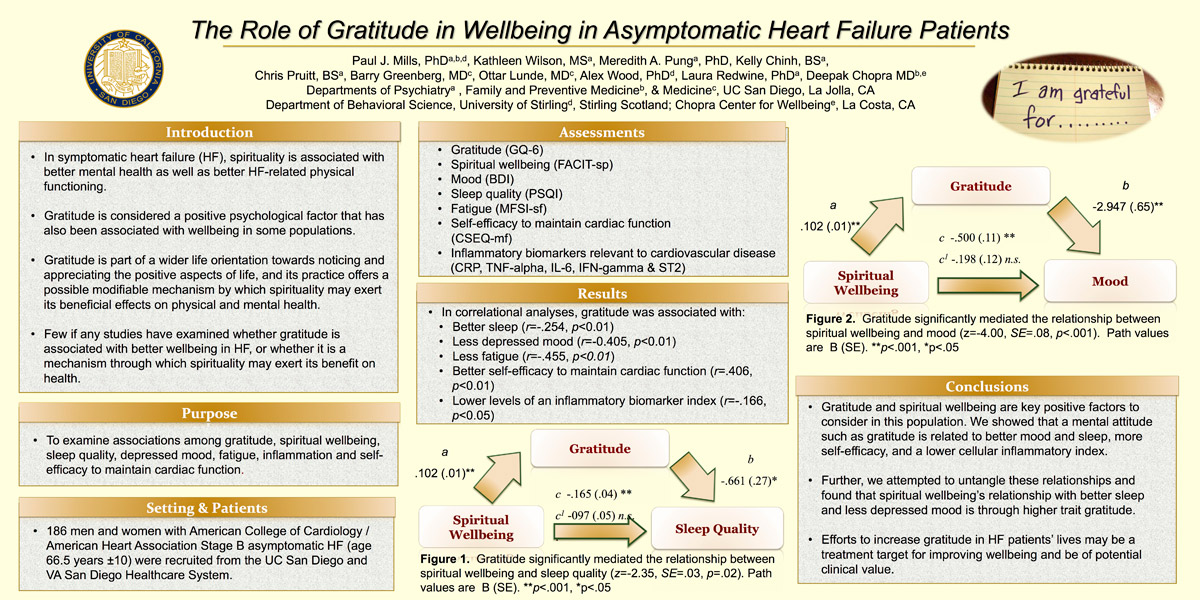GRATITUDE STUDY
Past Studies
Overview
This study assessed the role of gratitude in wellbeing among asymptomatic heart failure patients, and the results suggest that a simple gratitude exercise may, in fact, benefit these patients. It was conducted in collaboration with the University of California, San Diego (UCSD) and the University of Sterling, Scotland. The study was published in the Journal of Spirituality in Clinical Practice and can be accessed below.
The study included 186 asymptomatic Stage B heart failure patients, i.e., patients who did not have symptoms such as shortness of breath or fatigue. These patients are at risk for developing symptomatic, or stage C heart failure, which is associated with five times higher risk for death, according to the researchers, therefore preventing disease progression has significant value.
In this study, patients completed standard psychological tests so researchers could assess the patients’ levels of gratitude and spiritual well-being at baseline. Higher levels of gratitude were found to be associated with better mood, better sleep, less fatigue and less inflammation, a factor that worsens with the progression of heart failure. The study was able to find an association between feeling grateful and improved heart health markers, however, it was not designed to prove that feeling grateful actually caused the improvements. After the original cross-sectional study was completed, the researchers then sought to find out if prospectively introducing a gratitude intervention would show benefit in these patients, and whether feeling grateful actually led to improvements in heart health. In this study, patients were randomized to keep a gratitude journal for eight weeks where they were instructed to write down three things for which they were most grateful for on a daily basis. These patients were compared to a group that was treated with the standard protocol. This interventional study showed that keeping a gratitude journal seemed to help heart health even more.
“We found that those patients who kept gratitude journals for those eight weeks showed reductions in circulating levels of several important inflammatory biomarkers, as well as an increase in heart rate variability while they journaled. Improved heart rate variability is considered a measure of reduced cardiac risk,” study author Paul J Mills, a professor of family medicine and public health at the University of California, San Diego, said in a journal news release.
“It seems that a more grateful heart is indeed a more healthy heart and that gratitude journaling is an easy way to support cardiac health,” he concluded.
These results were published in the same issue of Spirituality in Clinical Practice and can be accessed below under study information.
– source: http://myhealth.ucsd.edu/6,698279#sthash.2PBYl7Zu.dpuf
You may follow what was recommended of participants in this study by keeping a gratitude journal. Find more resources on gratitude by following the links below:
- Take a Gratitude Quiz!
- Benefits of Gratitude
- Ways to Practice Gratitude
- Tips for Keeping a Gratitude Journal
- Get Started with a Shareable Gratitude Journal
STUDY INFORMATION:
STUDY COMMENTARY:
- The Spiritual Heart: Can Gratitude Change Cardiac Biology?
- Opening the Heart: A Spirituality of Gratitude
STUDY RESPONSE:
HUFFINGTON POST ARTICLES:
- Sowing Seeds of Gratitude to Cultivate Wellbeing
- Gratitude Journaling May Enhance Health in Cardiac Patients
- Feeling Grateful May Improve Health for Heart Failure Patients
- Arianna Huffington, Elizabeth Banks Discuss the Life Changing Benefits of Gratitude
TAKE THE GRATITUDE QUESTIONNAIRE:
Background Information: Gratitude, like other affects, conceivably could exist as an affective trait, a mood, or an emotion. The article associated with this paper is concerned primarily with gratitude as an affective trait that we call the grateful disposition or disposition toward gratitude. The grateful disposition is defined here as a generalized tendency to recognize and respond with grateful emotion to the roles of other people’s benevolence in the positive experiences and outcomes that one obtains. The Gratitude Questionnaire-Six-Item Form (GQ-6) is a six-item self-report questionnaire designed to assess individual differences in the proneness to experience gratitude in daily life. Respondents endorse each item on a 7-point Likert-type scale (where 1 = strongly disagree and 7 = strongly agree).
Source: http://www.midss.org/content/gratitude-questionaire-gq-6
Take the Gratitude Questionnaire here.
Find scoring instructions here.
Results
“We found that those patients who kept gratitude journals for those eight weeks showed reductions in circulating levels of several important inflammatory biomarkers, as well as an increase in heart rate variability while they journaled. Improved heart rate variability is considered a measure of reduced cardiac risk,” study author Paul J Mills, a professor of family medicine and public health at the University of California, San Diego, said in a journal news release.
“It seems that a more grateful heart is indeed a more healthy heart and that gratitude journaling is an easy way to support cardiac health,” he concluded.

